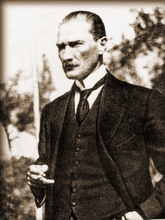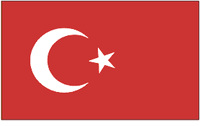
Man, I do admire Rosetta Stone (RS). However, I wish they had an answer key for some of these tougher phrases.
"Iki adam ata biniyor" is one of them. RS just shows me a picture of two men atop horses, riding them slowly across a field (nice idyllic image, though the image presented here is from a great John Ford movie named The Searchers). Parsing this was a little confusing:
- iki means 2, of course
- adam means man/men
- ata, on the other hand, can mean father or ancestor or be short for Atatürk. After a while, it dawned on me that perhaps this is one of those cases where a vowel was tacked onto at (horse). Doh! Lo and behold that's the case here. If this is an instance of the vowel harmony rule, its application escapes me in this case. What does the -a mean here?
- biniyor's root apparently is binmek: to know how to mount a horse or to know how to ride one.
Hold up—I just found "ata binmek" at my favorite web-based Turkish dictionary declaring the definition of "ride a horse" as "ata binmek". Oddly enough, if I look up "ata binmek" there, it says it means only "ride".
In any event, close enough for me! So, the -a tagged onto "at" is, apparently, not a vowel harmony application but just some kind of exception. Noted. :^)


1 comment:
The -a in "ata" isn't an exception, it's the dative case, used for indirect objects (to/for X). E.g. "Dennis'e yaziyorum" = "I am writing to Dennis." In English, of course, you don't ride "to" a horse, but whatcha gonna do, languages are funny that way.
Post a Comment